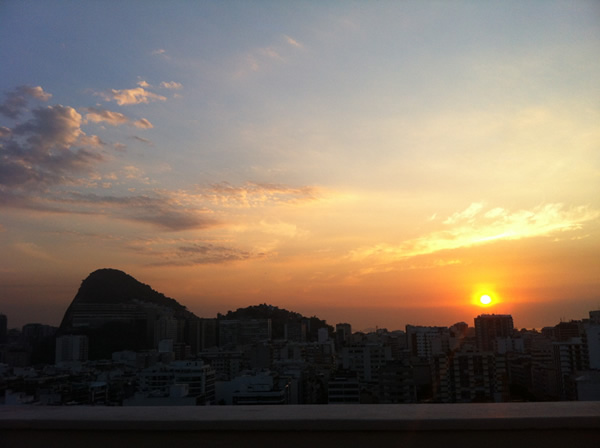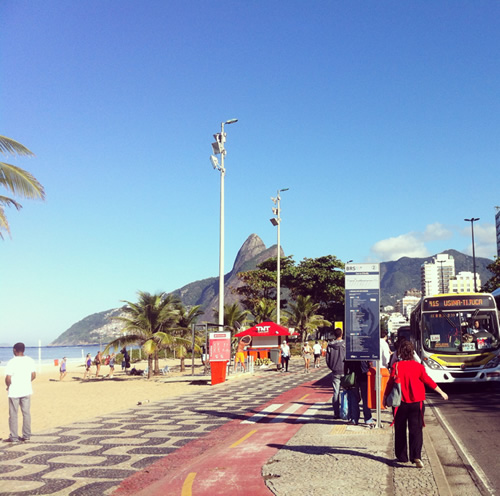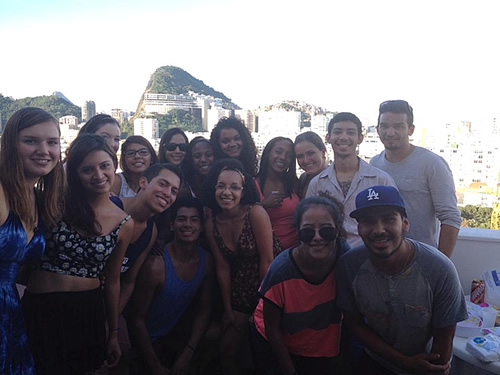A Year in Rio de Janeiro, Brazil
The Emotional Stages of Study Abroad
Article and photos by Marie Lefebvre

|
|
The view at sunrise from my balcony in my Brazilian homestay apartment during my second semester. |
At the PUC-Rio (Pontifical Catholic University of Rio de Janeiro) orientation on my first full day in Brazil, the international student coordinator warned us about the three phases experienced while studying abroad: honeymoon, anger, and acceptance. All the while, in my mind, I could not help thinking, "yeah, right, like I could ever have an angry phase here."
As my peers back home settled into stressful full-time jobs, I was living my dream and continuing to indulge in student life as a super senior at the University of California Berkeley, studying Portuguese abroad in idyllic Rio de Janeiro. I pictured my life for the next year: casually going to the beach after class to tan, exploring the city's natural beauty with beautiful Brazilian friends, traveling the enormous and diverse country every weekend...
Realities in the Rio Paradise
But when it rains, it pours, right?
I quickly woke up from my illusions as the realities of daily life in Brazil sometimes tested my patience.
As I began my first semester, I settled into the routine of sitting in traffic, getting lectured in Portuguese for 6 hours straight while at school, sitting in traffic some more, going to unpaid internship number one, then heading to unpaid internship number two, then back to sitting in traffic before collapsing in my bed, exhausted from the long day. So much for the myth about studying abroad being a glorified vacation.
The school could have been more inspiring, as my classes were lecture-based with little discussion. I found PUC, my university in Rio, to be socially impossible. There was a barrier between international students and Brazilian students. The local students were elite city youth who regularly vacationed in Florida, wore designer clothes, and paid for help at home. Most of these Brazilian students could not be bothered to befriend foreign exchange students.
To top it all, I had to move more than four times in the year, jumping from one exploitative landlord to the next. I even ended up in a Brazilian hospital just a couple weeks into school because of a nasty infection, probably related to all the stress I was experiencing from being in a new place and having to figure everything out by myself in a foreign language.
I finally settled into a nice apartment with two other lovely exchange students. Still, even then, the situation could have been better. Since most middle to upper-class families in Brazil have paid help or empregadas, the vast majority of apartments in Rio have tiny rooms (in the U.S., they would barely be considered the size of a walk-in closet) set aside for a full-time maid. The rooms usually face the inner courtyards of apartment buildings. So they are within earshot of virtually the whole apartment building. I chose to live in the empregada room because I wanted to live with my friends. The rent was relatively cheap, but I recall often being awoken by neighbors singing opera or washing their laundry in sinks outside.
But my apartment woes didn’t end there…
-
our apartment caught fire when no one was home, due to a portable fan exploding and leaving a hole in our entryway
-
the doorknob to the front door kept falling off
-
the toilet kept getting clogged and overflowing
-
the kitchen flooded in almost a foot of water
-
my dad, while visiting, had a metal chain and cross snatched from around his neck by a street child when we were walking near the beach, in broad daylight
I cried that day, first because of my irritation from the day's events and then because of feeling the previous semester's exhaustion crashing over me all at once.
Sometimes you need a good cry to put things into perspective.
I decided to critically examine my life in Brazil and determine what was wrong. I realized that the reason I was unhappy during my first semester in Rio was that not only had I lost the sense of wonder that had been so seductive upon first arrival, but as a result of the daily stresses in my life that were so debilitating that I could not fully enjoy the experience.
So, I decided to change that.
After my honeymoon and anger phases, I consciously rejected falling into an acceptance phase of resigned complacency — and entered one of rediscovery. By challenging myself to take an entirely new approach to studying abroad, I experienced Brazil with new eyes…and began living the best months of my life.

|
|
One of my first weeks in Brazil, happy as can be on a beach in the northeastern state of Bahia in Brazil.
|
For the second semester, I moved out of the apartment from hell into a homestay with a Brazilian family. I relinquished the independence of having my own place and the many responsibilities of renting, such as buying toilet paper or ensuring the apartment doesn't burn down. I decided to quit my internships and focus on just one I enjoyed. I enjoyed the simple things in my routine, such as commuting to my internship, because my daily bus commute, slow as it was, hugged the beach and was simply epic! I mixed up the school, internship, and sleep routine by going out more. So, instead of dreading returning to the weekly "grind" on Monday, it became my favorite day of the week. Monday night was now a chance to go to Pedra do Sal, a weekly samba street party frequented by local young professionals, students, and tourists in downtown Rio.

|
|
The bus stop where I caught the bus to my internship from February to July. Yes, that is the beach on the left.
|
I decided to travel more.
I volunteered at a hostel in Jericoacoara for a month, a tiny fishing town tucked between the sea and the desert and only reachable by trucks able to drive through the sand.
I took a trip at 4 a.m. in the bed of a truck through massive sand dunes and saw the sunrise over the Lencois Maranhenses National Park.
I reconnected with my first Portuguese teacher in the U.S., who lived in a different region of Brazil, and together, we explored the Pantanal — the world's largest wetland area.
I held a sloth and fished for piranhas in the Amazon.
I explored Sao Paulo, Latin America’s largest city.
I flew to Recife and proudly supported Team USA against Germany during the World Cup. I sprinted to my seat in the pouring rain, barely making it in time for the kickoff. I then took a packed, 13-hour overnight flight while having the flu to see my home country play against Belgium, this time in the city of Salvador.
I ran daily along Ipanema Beach and then even ran a half marathon on one of my last days in Brazil.
I hosted BBQs on my 14th-floor balcony, where acquaintances (Brazilians and foreigners alike) became my true friends.
I even started dating, and trust me, it’s GREAT language practice.
I relished even seemingly mundane interactions, like conversations about the weather with my host mom – and I realized that in a short time, I would no longer be able to speak Portuguese daily.

|
|
A group picture at a BBQ, or in Portuguese, churrasco, that I hosted for my Brazilian and international friends.
|
Most of all, I made sure that a sense of gratitude permeated everything I did to not take any of my time in Brazil for granted.
I cannot help but feel nostalgic, looking back on a crazy year in Brazil, so brimming with ups and downs. As true love stories go, I endured a lot of hardship. Still, through all the anger and frustration, I realized that my fondness for Brazil only grew over time and continued to do so until my year was winding up.
Today, as a study abroad veteran, here's my advice to those studying abroad: do not doubt the extraordinary nature of your experience away from home.
Luckily, I stayed in Brazil for a full academic year, so I had the time to learn from my mistakes and make the most of my final days. But I realize only some have such a luxury.
Living and studying in another country is a rare and extremely fulfilling period of your life, so make sure you fully embrace the unique experience.
Marie Lefebvre is a recent UC Berkeley graduate from Palo Alto, California. She majored in Geography and Spanish & Portuguese.
|
